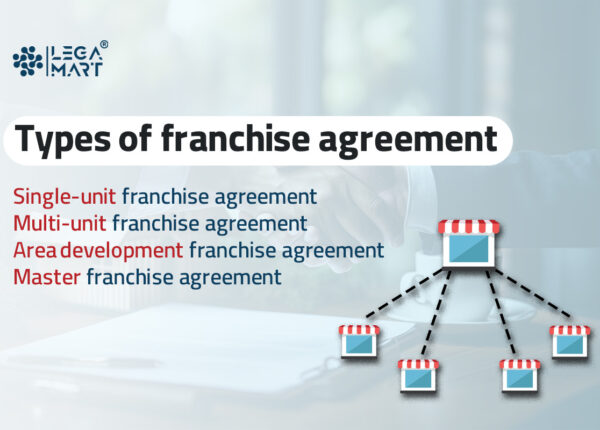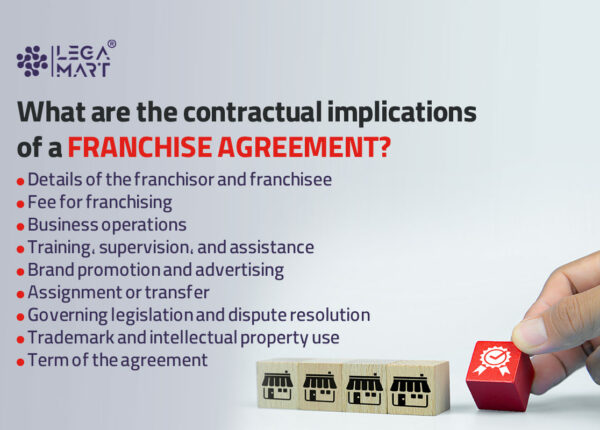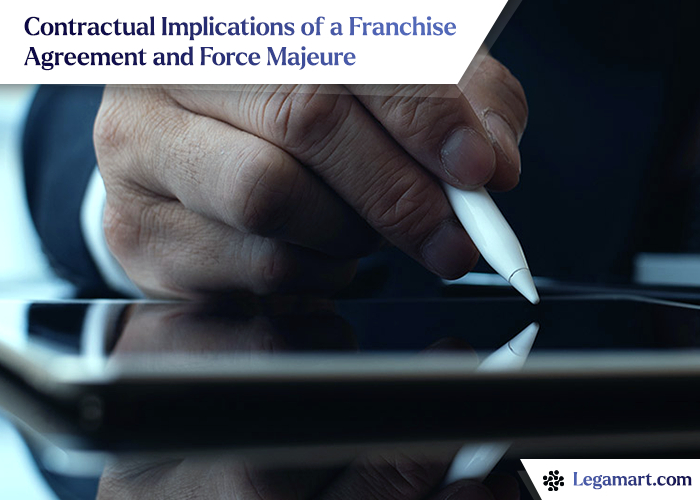In the modern-day, intricate world of franchising, where the promise of prosperity meets the blueprint of a brand, there exist moments when the stability of these alliances is put to the ultimate test. Imagine this: a prosperous chain of coastal restaurants, a beacon of seaside delight, suddenly forced to shut down its doors and run out due to an unexpected hurricane. Or maybe imagine a network of international cafes, carefully built to cater to global cravings, suddenly facing an unprecedented pandemic’s challenges. These are the moments when the minimalistic “force majeure” clause emerges as a spine-chilling challenge from the fine print of a franchisee contract, a critical area within Legal Practice & Specialization, shaking the very foundation of these business partnerships.
In 1979, when McDonald’s had to face a tornado that destroyed its restaurant and affected its business, the Court found that it was an act of God, for which McDonough was not liable to pay any royalties to McDonald’s during the closure period of the restaurant. But does the same logic extend to other Franchisee Contracts as well?
In exploring the contractual implications of a franchise agreement, we will take you through the importance of including the Force Majeure Clause and entering into Franchise Agreements, given the intricacies of modern-day business and its risks.
Introduction
Suppose you want to run a business locally but don’t have enough money to start your own business. In such cases, what will you do? Purchasing a franchise is the most suitable solution for it. However, it can only be possible if you protect your rights through a franchise agreement. However, the clauses of the franchisee agreement have some impacts on the business, which are vital to know.
Franchisor, Franchisee, and Franchise Agreement: What are they?
Franchisor
A franchisor owns the right to operate a business using the franchisor’s brand, expertise, and Intellectual property rights. The franchisor’s business is the original business that sells the rights to open new branches or stores. It is important to note that the franchisor doesn’t sell its business to the franchisee; instead, it sells its “rights” to the franchisee. If they sell their business, it is a transfer of ownership.
The business that buys the franchise rights is known as a franchisee, and the branch business is the franchisor. The relationship between the franchisor and the franchisee is more like a mentor and mentee because the franchisor continuously needs to guide the franchisee in running the business by training the employees, advertising, marketing, hiring staff, providing transportation, etc. There are well-known franchisors such as McDonald’s, Subway, etc.
Benefits of Franchisor
- Most often, a company uses franchising as a technique to expand its business all over the world. It helps the franchisors to do business in areas where the franchisor has the slightest knowledge, and franchisees utilize the franchisor’s local knowledge to expand their business. This expansion helps grow their selling of products and build a brand image in the local areas. In return, the franchisee provides the royalties to the franchisor to access the market and the brand name by taking responsibility for the financial transactions of the building unit.
- Franchising can be an excellent way to increase the market share with minimal capital expenditures.
- The Franchisors have the freedom to determine the scalability of the business. It depends upon factors such as resources, production growth, the nature of the local market, and customer demands, and the franchisor can choose how to scale the business in those areas. It ultimately benefits the franchisor because he can achieve his pre-determined goals.
- The franchisor gets an additional income through franchising through royalties from the franchisee.
Franchisee
A franchisee is a small business operator who gets the rights to operate the main business of the franchisor. To be precise, the franchisee purchases intellectual property rights such as trademarks and associated brands. It uses an appropriate knowledge of the local market to sell the products and meet the standards of the original business.
Benefits of the Franchisee
- The franchisee doesn’t have to put lots of money into setting up a new corporation because a franchise costs less than a new one.
- There will be stress on marketing and campaign of the brand’s products because the consumers already know about the brand and its products, so the franchisee doesn’t need to stress upon the brand recognition.
- The franchisee will have a support system from the franchisor on how to operate the business.
Franchising agreement
A franchise agreement is a legal agreement used to protect both parties’ rights, including Intellectual property rights. This agreement sets out the contractual implications of a franchise for both the franchisor and the franchisee.
If we talk about the rules and regulations, the UK doesn’t have specific legislation governing franchising agreements. However, the franchisee should seek a company certified by the British Franchise Association, a regulatory authority that helps the franchisee recognize potential franchisors.
Types of franchise agreement

Single-unit franchise agreement
In this agreement, franchisees are granted the right to open and run a single franchise unit under a single-unit agreement. This is the most common and widely utilized sort of agreement. These franchise arrangements are especially appealing to new franchisors since they usually offer a simple way to enter the world of franchising. If a franchisee performs well over time, the franchisor may consider increasing the contract to cover additional units.
Multi-unit franchise agreement
A multi-unit agreement gives the franchisee the authority to open and run more than one franchise unit. A multi-unit system is not limited to a particular geographical area. Franchisees may even have locations in various parts of town. Even in a few circumstances, these franchise agreements include deadlines that often require the franchisee to adhere to a timeline for establishing a certain number of units. If the franchisee fails to accomplish the agreed-upon deadline, the franchisor may be allowed to deal with other potential parties.
Area development franchise agreement
A multi-unit agreement is similar to an area development agreement in which the franchisee is granted the right to open and operate many units within a specific time frame. However, in many franchise arrangements, the franchisor even offers the franchisee exclusive development rights in a specific territory. No other franchisees will be permitted to open units in that geographic area during the contract duration.
Master franchise agreement
Area development agreements give franchisees fewer powers than master franchise agreements. A master franchisee has the right and obligation to open a set number of units inside a specific territory, as well as the right to sell franchises to other people within their geographic location. Master franchisees are similar to franchisors in that they only operate in a specific territory. They assume many of the franchisor’s responsibilities, such as training and support, and profit from franchise fees and royalties.
New franchisors may find it tough to navigate the franchising sector. Turn to the Franchise & Legamart for answers to all your queries and personalized, experienced guidance.
Making decisions on your franchising agreement will be a lot easier with the assistance of our expert attorneys. Contact us now to book a professional consultation to discuss franchise options.
What are the contractual implications of a franchise agreement?

A franchisor is just like any other company that wants to expand its business with the help of franchise agreements, which help the franchisor to set up the business in profitable locations and extend its business by increasing the business growth.
However, to achieve the benefits mentioned above, the franchisor needs to support and guide the franchisee in the best way possible and hence to make them legally binding to the same, a franchise agreement is signed. The contractual implications of a franchise agreement makes both the parties duty bound to the following:
Details of the franchisor and franchisee: The franchise agreement serves as a comprehensive blueprint, delineating the specific duties and responsibilities incumbent upon both the franchisor and franchisee. This legally binding document outlines the precise obligations each party must fulfill to ensure the smooth operation and success of the franchise partnership. By explicitly defining roles and expectations, the agreement sets the framework for a harmonious and mutually beneficial business relationship.
Fee for franchising: In the franchise agreement, there is a separate section for royalties, franchise fees, deposits, advertising charges, and so on. It even includes the franchise fee’s due date, as well as the specific mode of payment. While signing the franchise agreement, it is vital that both the franchisee and the franchisor clearly understand the agreement and follow the fees and other terms guidelines listed in the franchise agreement.
Business operations: One of the primary benefits of having a franchise is that the franchisor is constantly available to help the franchisee manage their particular franchise unit because they have numerous years of expertise in this field. As a result, all franchise arrangements should include extensive information on the level of support the franchisor will offer and a list of the franchisee’s duties. Below are some of the most essential points of franchise operations that are written in the franchise agreement.
Training, supervision, and assistance: Basically, franchisors must provide proper training, assistance, and supervision to all of their franchise units for a specific time, or it can even be daily. The franchise agreement specifies the franchisor’s obligations to the franchisee regarding training, supervision, and assistance. The franchise agreement also dives into considerable depth about the franchisor’s support for the day-to-day operation of those activities.
- The specifications state that the franchisee will only purchase services or products from the franchisor if such a need exists;
- The need to manage accounts and other specified details per the franchise agreement and
- The specific details of services and goods that the franchise can provide.
- The need to manage and execute the franchise unit following the franchisor’s standards;
Brand Promotion and Advertising: Franchisors invest large amounts of money in brand promotion. As a result, it is the franchisor’s responsibility for promotional spending for franchisees, and franchisees are required to contribute to brand-building efforts, which are listed in the franchise agreement.
Assignment or transfer: Many franchise agreements clearly express that any transfer or assignment of interest in a franchise unit must bear the written approval of the franchisor.
Governing legislation and dispute resolution: It is regarded as one of the best practices to include information regarding the governing laws and jurisdictions for franchise agreement management in case of any conflict. If there exists a franchise contract between a foreign entity and an Indian entity, or between any two parties, the parties, through an agreement, may basically choose the foreign country’s law as the law which is to be applied and mutually decide that the foreign country’s courts or home nation courts shall have exclusive authority over the dispute. To achieve a cost-effective and speedy resolution, both parties should agree on alternative dispute resolution mechanisms such as conciliation, arbitration, and mediation.
Trademark and intellectual property use: It is one of the most crucial components of a franchise agreement. You have to verify that the franchisor owns a trademark that is registered and has complete rights to it. The franchisor must also explain which marks, symbols, or words are registered trademarks.
Many franchise arrangements include terms requiring the franchisee to report to the franchisor if any trademark infringement occurs or to avoid causing any damage to the trademark during its use.
Finally, the franchise agreement should specify who owns the trademark and include specific clauses prohibiting its use after the franchise agreement expires.
Term of the agreement: The franchise agreement must also include the agreement’s specific provisions, the provision for renewal, the effect of termination, and the length of the agreement.
The UK Competition Act 1998 regulates all the agreements, including the franchise agreements. Still, it only holds the anti-competitive agreements, which means the agreements that may affect trade and competition in the UK.
There are several legal steps to follow when entering into a franchising agreement, such as:
- Both the parties need to sign a confidentiality agreement.
- They must enter into a deposit agreement and must pay the deposits.
- The parties should set terms and contractual implications of a franchise in the agreements, which must benefit and protect both parties.
What is force majeure?
The term “force majeure” refers to a contractual implication of a franchise mentioned in the franchise agreement that is invoked when an event occurs that is beyond the control of the parties and restrains them from performing their contractual obligations.
Almost all franchise agreements include the force majeure clause, albeit in a different form. There is no specific definition of force majeure in English law. However, it seeks permission to terminate the franchise agreement because that will cause a breach of agreement if such an event occurs.
Some everyday events that constitute force majeure, such as earthquakes, floods, wars, terrorism, pandemics, or any governmental actions, etc., may restrict fulfillment of the duties and contractual implications of the franchise agreement.
What is the impact of force majeure on franchise contracts?
Franchise agreements often contain the clause of “force majeure,” which means an “act of god,” though it doesn’t have a legal definition.
Such a clause impacts the contractual implications of a franchise in case an unforeseeable situation occurs, for example, the coronavirus pandemic in the current scenario.
Conclusion
It is a profitable idea for a franchisee and the franchisor to enter into a franchise contract as it can provide enormous growth to the business.
Even the locals can benefit from using the brand’s products without having any issues with access. It is vital that both parties adhere to their responsibilities as mentioned in the agreement and carefully set down the terms and contractual implications of a franchise that will benefit them.
As a pandemic has recently hit the world, it is evident that one of the most important clauses is “force majeure,” as it deals with natural events or events that aren’t in control of the parties. Eventually, it can lead to a breach of contract. However, even in such situations, force majeure may not terminate the whole agreement if there is a possibility to do any of the contractual implications of the franchise mentioned in the contract.
If you are stuck in any such situation, you can seek assistance from a franchise lawyer with extensive knowledge of franchise laws and agreements and how to offer unique solutions. And now, with LegaMart, you can hire a franchise lawyer within minutes by browsing the LegaMart directory for lawyers and choosing one with the expertise you require.




